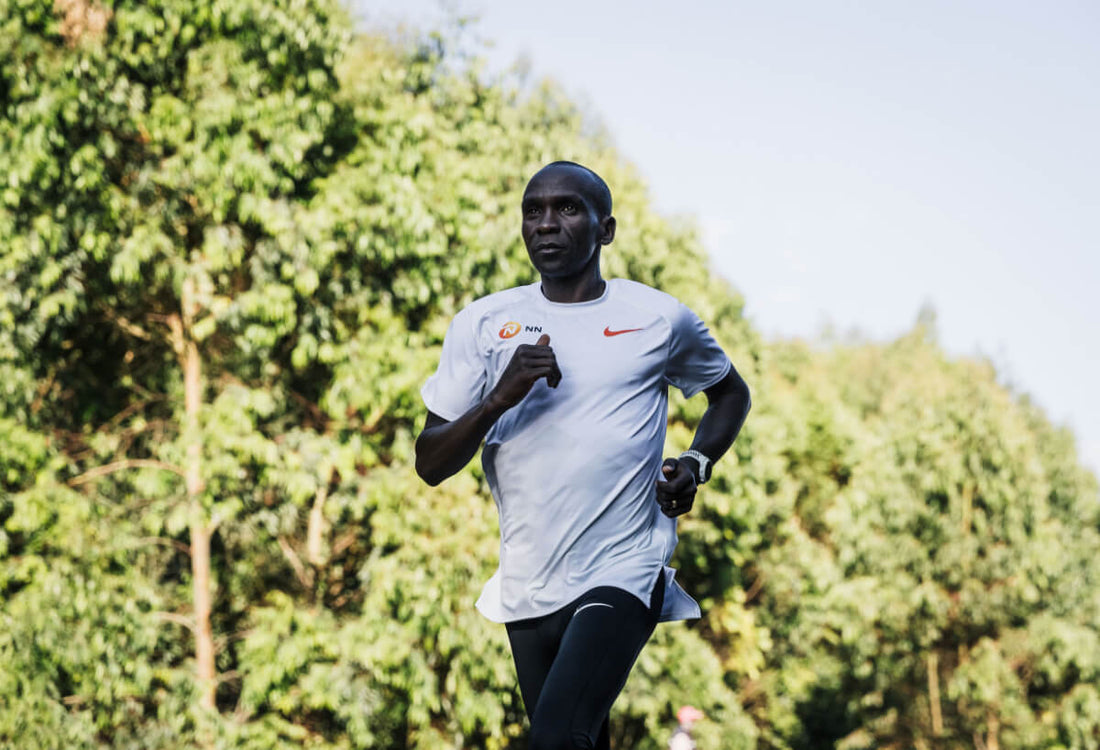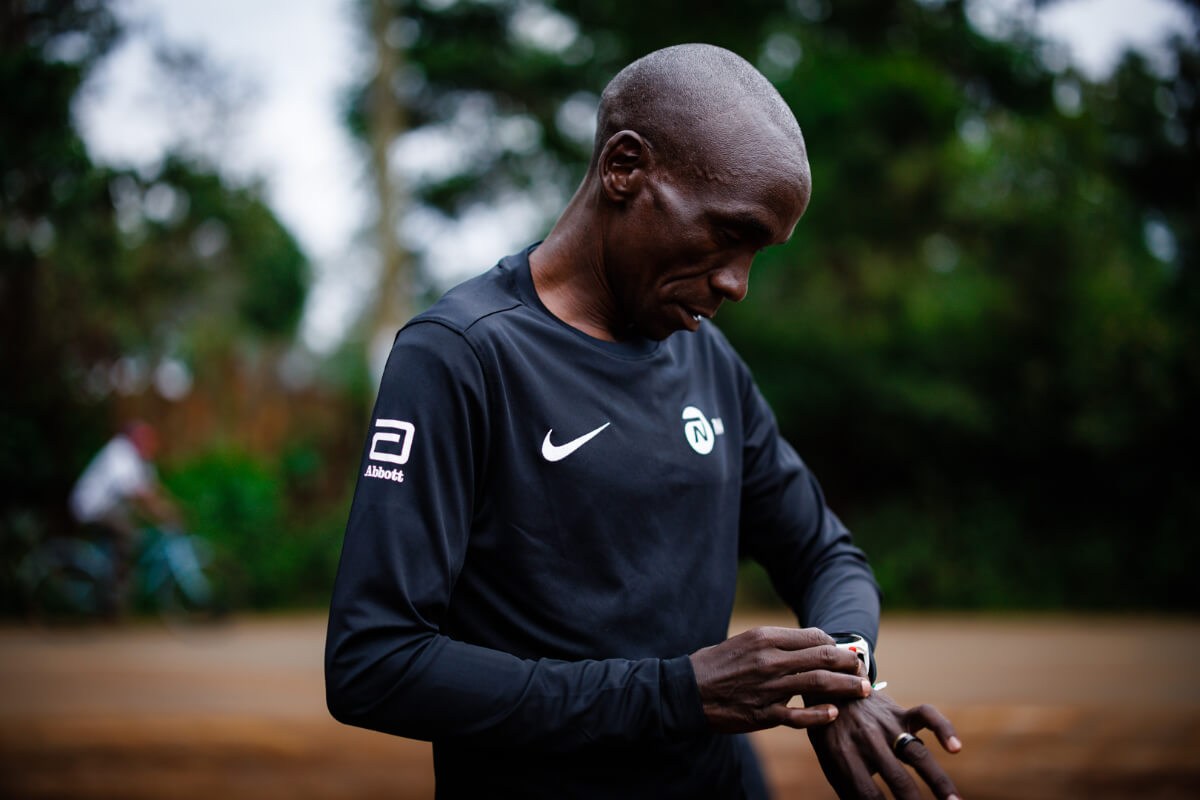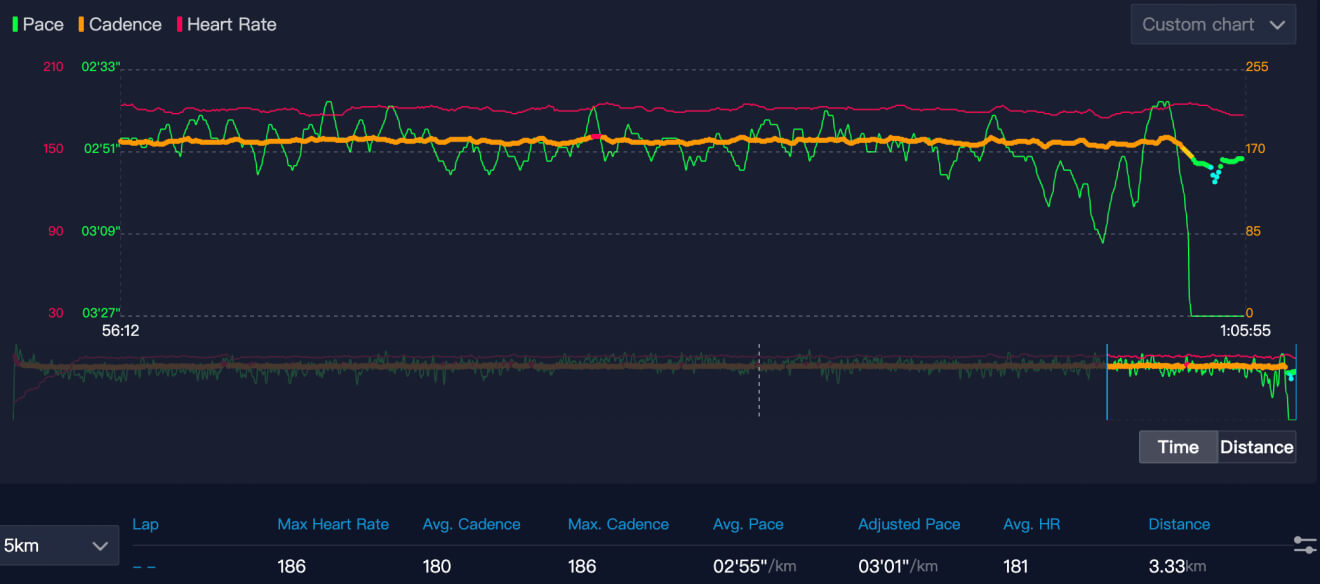
Eliud Kipchoge - analysis of breaking the marathon world record, Berlin 2022
author: ralpu
December 22, 2022

photo: COROS
History was being made at the Berlin Marathon in September 2022. Eliud Kipchoge broke his own record from 2018 and set a new marathon record with a time of 2h:01m:09s. In this article, we delve into those incredible two hours and take a detailed look at the data from this fantastic performance.
Introduction
On Sunday, September 25, 2022, Eliud Kipchoge set a new world record in the marathon with a time of 2h:01m:09s. Eliud is considered by many to be the best marathon runner of all time. His performances confirm this - he won gold medals in the marathon at the last two Olympics and was the holder of the previous official world record in the marathon (2h:01m:39s, Berlin 2018). A sports resume from another planet.

How is something like this possible, how does such a feat happen, and how does an athlete achieve such a result? And while detailed data on Kipchoge’s performance is not publicly available, his pacer Moses provided exclusive access to his performance data. Moses had all of his data measured by the COROS PACE 2 model over the first 23 km. This gave COROS unique access to the precise metrics of this unique feat.
Eliud Kipchoge is a COROS brand ambassador and actively participates in the development of COROS products and software. Read the details of this exclusive collaboration in our blog article .
The article below compares Kipchoge's old record from 2018 with the new record from autumn 2022 in Berlin. It highlights key data recorded by pacer Moses Koech's watch. Moses and Eliud are members of the elite NN Running Team. Let's dive into the data.

photo: COROS
Moses Koech: pacer on the NN Running Team
Kipchoge was assisted in his attempt to break the world record by two pacers from the elite NN Running Team - Moses Koech and Noah Kipkemboi. (A pacer is someone who maintains a set pace by being in front of an athlete and, so to speak, “pulls” them, or slows them down so that their pace doesn’t burn out.) Moses’ job was to ensure that Kipchoge ran the first half of the marathon at the set pace. Moses is one of the best runners in the world. His personal best in the half marathon is 1h:00m:00s (Barcelona 2020). Moses was in a more than good position to ensure that he would push Kipchoge in the first half to a performance that would eventually lead to a marathon record.

Training intensity
Moses places a lot of emphasis on developing the body's aerobic capacity in his training. This is not surprising given his specialization in half marathons. Data from his training 4 weeks before Berlin shows that most of his training is done at light effort (zones 1 and 2) or in the threshold zone. When performing a marathon, elite runners are often on the edge of the aerobic threshold zone. This is exactly the type of training a marathon runner wants to improve their performance.

Threshold pace
Moses has an elite threshold pace of 2m:48s/km. In general, we can maintain our threshold pace for 40-75 minutes depending on our individual training focus. Moses paced Kipchoge with a performance in his threshold zone, where he ran approximately 23km and then pulled back. It was a surgically precise running performance from Moses.

Analysis of the Berlin Marathon 2022
The performance at the Berlin Marathon 2022 will go down in history as one of the greatest endurance performances ever. It all started fast and furious right from the start - Kipchoge and his pacers set a crazy pace in the first five kilometers. They were immediately ahead of the world record. The following data shows the effort required to achieve the record pace and also compares the data from Berlin 2022 with the old record from 2018.

0 - 5km
14m:14s split time of the leg
14m:14s total time

Berlin 2022 Just as we ordinary earthlings get a rush of adrenaline at the start, so does the best runner in the world. Moses set a hell of a pace right from the start. The data shows that once Moses settled into his planned pace, his heart rate stabilized at a steady 178-180 bpm. He ran the first 5km at an average pace of 2m:51s/km. That was extremely fast. Not only was their pace ahead of the world record pace right from the start, Moses' body also responded well and functioned in its threshold zone. Moses reached a maximum cadence of 214 during this stretch.
In 2018, Kipchoge ran the first 5km in 14m:24s. The 10-second lead over the old record was intentional, as the only way to rewrite history was to start aggressively. Temperatures around 11°C and only a light wind created the perfect backdrop for a historic day.
5 - 10 km
14m:09s split time of the section
28m:23s total time

Berlin 2022 The pace picked up further on this section, culminating in a pace of 2m:38s/km. The entire support team and Kipchoge showed no signs of slowing down. There were only 3 runners and 3 pacers on this section and they were already racing at the pace and time of the fastest marathon in history. Moses reached a maximum cadence of 191 and an average pace of 2m:49s/km. Moses was in his threshold zone throughout this section, helping Kipchoge to achieve a faster pace than his 2018 world record.
In the 5-10km stretch, Kipchoge's team had built an average lead of 5.4 seconds per kilometre, and the cumulative lead over the record was already 38 seconds. Moses had a choice - either ease up a bit and stay with Kipchoge longer, or continue at this insane pace in his threshold zone to whip Kipchoge into a historic performance. Moses acted as a teammate and chose the latter.
10 - 15 km
14m:10s split time of the leg
42m:33s total time

Berlin 2022 This was the fastest segment. Moses maintained an average pace of 2m:46s/km with a cadence of 181. Towards the end of this section, Moses' heart rate began to slowly drop to 180 and this superhuman pace slowly but surely began to catch up with him. However, he created a great backdrop for Kipchoge and the second half of the marathon.
Kipchoge looks good and has everything under control. In 2018, he ran the first 15 km in 43m:38s. Now he's a full 1 minute and 5 seconds faster! And while many similar performances use the negative split tactic - i.e. the second half of the race is faster than the first, the NN Running Team was on a mission from the start and literally outclassed this strategy. Moses is fully settled in his threshold zone and Kipchoge is by his side.
15 - 20 km
14m:12s split time of the section
56m:45s total time

Berlin 2022 There are only 2 competitors left on the course. Kipchoge still has both of his pacers with him and they are rolling along at a pace of 2m:48s/km. Moses starts to slow his cadence slightly in this 4th segment and he managed to peak at 186 in this section. This is a sign that his legs are starting to get heavy and he is relying more on stride length than stride frequency (cadence). However, the pace remains solid. Elite performance requires sacrifice. Everyone on the course is in the red and everyone is immersed in the valley of suffering.
The gap to the record is widening. But the pacers have been working at their threshold pace for almost an hour. The human body can only function in this zone for so long, then it needs a reset. Is this part of a well-thought-out plan or did everyone get carried away by excitement?
21.09 km
59m:51s half marathon

Berlin 2022 This was the best performance of his life for Moses. Pacing Kipchoge in Berlin 2022, he improved his own personal best with a time of 59m:51s and an average pace of 2m:49s/km. And he even extended the half marathon route himself with small detours at the refreshment stops. His average heart rate on the half marathon course is 177 beats per minute and a maximum of 186.
20 - 25 km
14m:23s split time of the section
1h:11m:08s total time

Berlin 2022 This was the last segment where Moses would pace Kipchoge. At 23.34km, Moses improved his threshold pace from 2m:54s/km to 2m:48s/km. Moses fulfilled his role as pacer 100%. Now his eyes are on Eliud and he has to run the remaining 19km alone.
The onus is now on Kipchoge. He only gained one second on the previous stage from his 2018 record, which he set with a negative split time tactic. Can he do it again in 2022? And while a cumulative lead of 76 seconds seems like a sufficient reserve, he still has 19 km to go alone. This lead of more than a minute was created mainly thanks to the pacers. There is enormous pressure on Kipchoge to maintain it. Only the best athletes can withstand this pressure.
25 - 30 km
14m:32s split time of the section
1h:25m:40s total time

photo: COROS
Berlin 2022 As mentioned earlier, the human body can only function at its threshold pace for a certain period of time and then requires rest. The limiting factor is the energy requirement related to the efficient breakdown of lactic acid from the muscles, so the best strategy for a marathon is to run it just below threshold pace. Although we do not know Kipchoge's exact values, we can assume that he ran exactly in this window.
Kipchoge slowed down for the first time on this stretch - he lost 9 seconds. And even though he slows down, he still has enough margin to lose 4.47s/km and still beat the 2018 record. On the track, Kipchoge moved from second to the lead. Now there really is no one ahead of him. Now it's just a race between his will to suffer and time.
Eliud Kipchoge uses the COROS PACE 2 model. He chose this model also because of the very low weight of the watch - only 29 grams (the lightest GPS watch at the time of its launch). Eliud uses the COROS APEX 2 Pro model for his volume training and hilly training.
30 - 35 km
14m:30s split time of the section
1h:40m:10s total time

photo: COROS
Berlin 2022 Kipchoge ran this 5km slightly faster than the previous section. While the 2022 performance does not replicate the negative split strategy of 2018, Kipchoge is still maintaining a steady pace of 2m:53s - 2m:55s/km.
There was no official timekeeping at 35km in 2018. However, we can estimate that Kipchoge is still losing time compared to 2018. However, thanks to the lead he built in the first part of the race, this is nothing dramatic. Kipchoge continues to maintain a steady pace to break the world record.
35 - 40 km
14m:43s split time of the section
1h:54m:53s total time

photo: COROS
Berlin 2022 We can only guess what is going on in Kipchoge's mind right now. The record is within reach, but it must be really painful. The data confirms it - the pace has dropped to 2m:57s/km, which is a drop of about 6-8 seconds per kilometer compared to the start of the race. However, when breaking the world record, one has to give it their all and without a doubt Kipchoge is squeezing absolutely everything out of himself right now.
A 39-second cushion and 2.195 kilometers to go. It's almost within reach. The spectators along the track are in a frenzy.
40 - 42.195 km
6m:16s split time of the section
2h:01m:09s total time

photo: COROS
The best marathon performance of all time was run on September 25, 2022 in Berlin. Eliud Kipchoge, surrounded by a team of exceptional runners, ran a time of 2h:01m:09s. History is being rewritten and congratulations to Eliud on this fantastic performance!

photo: COROS
Conclusion
Eliud Kipchoge broke the world marathon record in Berlin in September 2022. Behind this phenomenal feat lies a lot of hard work and sacrifice. His performance and life story in humble circumstances in Africa inspires many people. We believe that experiencing a September day in Berlin will inspire you too.
Source: COROS
